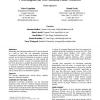408 search results - page 27 / 82 » Cooperative checkpointing theory |
AI
2006
Springer
14 years 1 months ago
2006
Springer
So far, most equilibrium concepts in game theory require that the rewards and actions of the other agents are known and/or observed by all agents. However, in real life problems, a...
ROBOCUP
2004
Springer
14 years 3 months ago
2004
Springer
The paper discusses a top-down approach to model soccer knowledge, as it can be found in soccer theory books. The goal is to model soccer strategies and tactics in a way that they ...
CHI
2003
ACM
14 years 10 months ago
2003
ACM
Historically, the dominant paradigm in HCI, when it appeared as a field in early 80s, was information processing ("cognitivist") psychology. In recent decades, as the fo...
ECAI
2006
Springer
14 years 1 months ago
2006
Springer
Abstract. Computational Game Theory is a way to study and evaluate behaviors using game theory models, via agent-based computer simulations. One of the most known example of this a...
PIMRC
2008
IEEE
14 years 4 months ago
2008
IEEE
—The development of mobile ad hoc systems have considerably emphasized the need for a better understanding of the factors that influence the systems’ performance, i.e., mobili...


